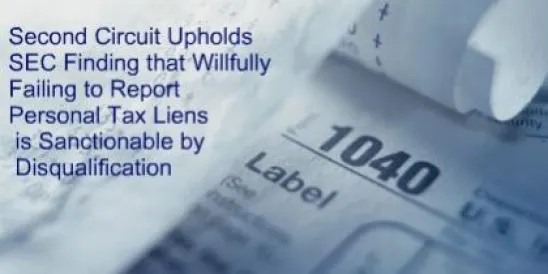The Second Circuit recently affirmed an SEC decision in Mathis v. SEC, 2012 WL 447378 (2d Cir. Feb. 14, 2012), finding that a registered representative’s failure to disclose tax liens on his Form U-4 was material enough to uphold a suspension of his license. The court also agreed that the SEC’s interpretation of “willfulness” did not require the registered representative to be aware that he was violating a securities rule or law.
Mathis, a financial advisor, was registered with FINRA (and previously NASD) at various firms from 1985 through 2002. On three occasions, in 1995, 1999, and 2000, Mathis signed and filed Forms U-4 as a registered representative and principal of the various firms with whom he was employed. On his Forms U-4, Mathis responded “no” to the question “Do you have any unsatisfied judgments or liens against you?” Also, in connection with his employment with one of the broker-dealers, Mathis completed an Annual Representative Certification in 1999. Mathis represented that he had “paid all federal, state and local taxes due in full” and denied having “any liens entered against [him], which were not previously disclosed on [F]orm U-4.” Pursuant to FINRA rules, Mathis had the obligation to provide truthful answers to the Form U-4 questions, as well as the obligation to amend his Form U-4 within 30 days after learning of facts giving rise to any amendment.
In several written notices between August 1996 and September 2002, the Internal Revenue Service (“IRS”) informed Mathis that it had entered five unsatisfied tax liens against him, totaling $634,436.28, for Mathis’s failure to pay a large portion of his personal income taxes for the years 1993, 1994, 1995, 1997, 1999, and 2000. In late 1999 and again in 2002, the IRS informed Mathis that a Notice of Tax Lien had already been filed against him. Despite having learned of the tax liens as early as August 1996, Mathis nonetheless failed to amend the original Form U-4 he filed in 1995, failed to disclose the liens on his Forms U-4 filed in 1999 and 2000, and failed to amend these same Forms U-4 upon receiving the IRS notices in 2002.
FINRA’s Department of Enforcement charged Mathis with willfully failing to amend his original Form U-4 and willfully failing to disclose the tax liens on the Forms U-4 filed in 1999 and 2000. A FINRA Hearing Panel found that Mathis became aware of the disclosure requirement after January 1999 and, thus, willfully failed to disclose the tax liens on his Forms U-4 and falsely represented on his Annual Representative Certification that he was current on his taxes. The Panel imposed a $10,000 fine and a three-month suspension. Mathis appealed the decision to FINRA’s National Adjudicatory Council (“NAC”), which concluded that Mathis had willfully failed to amend his Form U-4 and willfully failed to disclose the liens on his two subsequent Forms U-4. The NAC affirmed the Panel’s sanction.
Mathis then petitioned the SEC to review the NAC’s decision. The SEC affirmed the NAC’s finding of willfulness on Mathis’s part. The SEC determined that Mathis had voluntarily provided false answers on his Forms U-4 and that the nondisclosure was material. The SEC explained that willfulness means that “the respondent ‘intentionally commit[ed] the act which constitutes the violation’ and ‘does not require that the person also be aware that he is violating one of the Rules or Acts.’” Accordingly, the SEC found that Mathis had willfully violated Rule IM-1000-11 and Conduct Rule 2110. This willfulness, by operation of Sections 3(a)(39)(F) and 15A(g)(2) of the Exchange Act, 15 U.S.C. §§ 78c(a)(39)(F) and 78o-3(g)(2),2 subjected Mathis to a statutory disqualification or bar, rather than just a monetary penalty or temporary suspension. Mathis appealed to the Second Circuit Court of Appeals to review the SEC’s order subjecting him to statutory disqualification.
The Second Circuit Court of Appeals found that the SEC did not abuse its discretion when it concluded that Mathis had willfully failed to disclose the tax liens within the meaning of Section 3(a)(39)(F) because he “voluntarily provided false answers on his Forms U-4.” The court further agreed that “willfully” means “intentionally committing the act which constitutes the violation. There is no requirement that the actor also be aware that he is violating one of the Rules or Acts.” With respect to materiality, the SEC found that Mathis’s tax liens were a material fact, taking into consideration the large dollar amount of the liens, the number of liens, and the lengthy period of time during which the information was not disclosed.
As such, the Second Circuit found that Mathis acted willfully and was subject to disqualification because the evidence established that he intentionally submitted Forms U-4 knowing the forms contained material false information and intentionally failed to amend his original Form U-4. Accordingly, the court affirmed the SEC’s decision.
Based on this holding, firms may want to consider performing tax lien searches on its brokers to be certain that any liens have been fully disclosed in order to avoid future claims (potentially by claimants’ attorneys) that a broker violated disclosure requirements. Additionally, although this holding was in the narrow context of Section 3(a)(39)(F), firms should be aware that claimants' attorneys may nonetheless attempt to use this decision in an attempt to lower the standard for proving willfulness.
1FINRA Membership Rule IM-1000-1 provides as follows:
The filing with the Association of information with respect to membership or registration as a Registered Representative which is incomplete or inaccurate so as to be misleading, or which could in any way tend to mislead, or the failure to correct such filing after notice thereof, may be deemed to be conduct inconsistent with just and equitable principles of trade and when discovered may be sufficient cause for appropriate disciplinary action.
2Under § 3(a)(30)(f) of the Exchange Act, a person may be barred from association if he or she has:
willfully made or caused to be made in any application for membership or participation in, or to become associated with a member of, a self-regulatory organization, any statement which was at the time, and in the light of the circumstances under which it was made, false or misleading with



 />i
/>i
